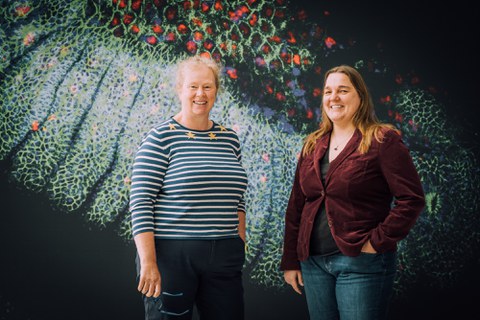Mar 08, 2023
DFG Funding to Unravel Gene Regulation in Spinal Cord Regeneration

Prof. Catherina Becker (left) and Dr. Anna Poetsch (right).
Neurobiologist Prof. Catherina Becker and computational biologist Dr. Anna Poetsch have started a new interdisciplinary project to study changes in gene regulation during spinal cord regeneration in zebrafish. The project is funded by the Sequencing Costs in Projects program of the German Research Foundation (DFG).
The spinal cord is a long bundle of nerves that connects the brain to the rest of the body. It is essential for controlling the movement of our muscles. Humans cannot regenerate damaged spinal cords, but a handful of animals can.
Prof. Catherina Becker from the Center of Regenerative Therapies Dresden (CRTD) and Dr. Anna Poetsch from the Biotechnology Center (BIOTEC) of TU Dresden set out to leverage the state-of-the-art sequencing technology and computational algorithms to achieve an unprecedented resolution of molecular changes during spinal cord regeneration in zebrafish.
Spying on the Neural Progenitor Cells
Zebrafish is an animal with enormous regenerative potential. After damage to the zebrafish spinal cord, a local pool of stem cells can replace the lost nerve cells. “These cells are known as neural progenitors, and finding them in the zebrafish spinal cord was one of the key discoveries of my group,” says Prof. Becker.
To respond to the injury, neural progenitors must change the way they interpret their genome. Scientists can now study this process at the level of a single cell and observe it step by step throughout the regeneration process.
“Every cell has a complex regulatory network based on multiple layers of gene regulation that all contribute to changes in gene expression and cell fate. Each layer of gene regulation requires a different analysis technique, e.g., we will use single cell RNA sequencing to see how the regulation of the genome has changed. The challenge is to bring all of this high-dimensional and multimodal data together to build a coherent picture of what is happening in the cell. We will use a variety of computational approaches and machine learning algorithms to do that,” explains Dr. Anna Poetsch.
Another Piece of the Puzzle
“The fundamental goal of my career is to characterize the process of spinal cord regeneration in zebrafish and to understand why fish can do that and humans cannot. Through this work, we will gain new insights into how exactly the regeneration process is controlled at the genome level. This is another key piece of the regeneration puzzle,” adds Prof. Catherina Becker.
Scientific Contact:
Prof. Catherina Becker
Center for Regenerative Therapies Dresden (CRTD)
Email:
